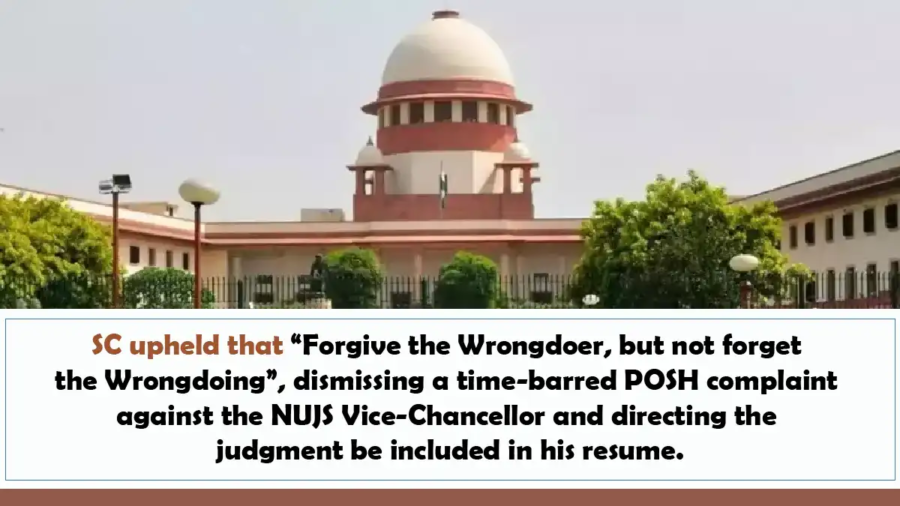“Forgive the Wrongdoer, but not forget the Wrongdoing”: SC Upholds Time-barred Dismissal of POSH Complaint, Directs Judgment to form part of Vice-Chancellor’s Resume
Facts of the case:
The Appellant, a faculty member at NUJS, Kolkata, filed a complaint on 26th December 2023, before the Local Complaints Committee (LCC) under the Sexual Harassment of Women at Workplace (Prevention, Prohibition and Redressal) Act, 2013 (POSH Act), alleging sexual harassment by the Vice-Chancellor (Respondent No.1). According to the complaint, the last incident of sexual harassment occurred in April 2023. Subsequently on 29th August 2023, the Appellant received a letter from the Respondent Vice-Chancellor removing her as Director, Centre of Financial, Regulatory and Governance Studies.
The LCC dismissed the complaint as barred by limitation, holding that the last alleged incident took place in April 2023 and the complaint had been filed beyond the statutory period of three months, even after considering the permissible extension of six months under Section 9 of the POSH Act.
The Appellant approached the Calcutta High Court, and the learned Single Judge set aside the LCC’s order, observing that threats, intimidation, and hostile work environment allegedly created by the Vice-Chancellor after April 2023 extended the limitation period. On appeal, the Division Bench reversed this decision, holding that subsequent administrative actions, including removal from positions, were collective decisions of the Executive Council and external bodies and could not be construed as acts of sexual harassment. It restored the order of the LCC.
Subsequently, the Appellant approached the Supreme Court in the present case.
Contentions of the Appellant:
The Appellant contended that while the last act of sexual harassment took place in April, the adverse administrative measures, and removal from directorial position in August 2023 constituted continuing sexual harassment and brought the complaint within limitation. It was argued that these actions created a ‘hostile work environment’ within the meaning of Section 3 of the POSH Act. The Appellant further submitted that even if the complaint were to be treated as delayed, there were ‘mitigating circumstances’, wherein she had attempted to resolve the issue within the institution, and that her complaint should not have been rejected on purely technical grounds of limitation.
Contentions of the Respondent:
The Respondent contended that the last incident of sexual harassment alleged by the Appellant occurred in April 2023. Subsequent actions in August 2023, such as her removal from directorship and administrative inquiries, were not acts of harassment but independent, collective decisions of statutory bodies like the Executive Council and NFCG. These decisions had no connection with the allegations of sexual misconduct and could not extend the limitation period under Section 9 of the POSH Act.
It was further pointed out that the Appellant herself had filed an application seeking condonation of delay, thereby acknowledging that April 2023 was the last relevant incident. Thus, her complaint filed in December 2023 was clearly beyond limitation and liable to be dismissed.
Court’s Observations:
The Court noted that the issue of limitation is ordinarily a mixed question of both fact and law, and that it might not be possible to throw out a complaint without collecting material on the factual aspects relating to limitation. However, the Court observed-
“Nonetheless, where a complaint on the simple reading of the averments made therein appears to be patently barred by limitation, it can be rejected at the very first instance on the analogy of Order VII Rule 11 CPC, without even calling the other side to participate in the proceedings.”
The Court held that the last alleged act of sexual harassment took place in April 2023. Administrative actions taken in August 2023 were independent, collective decisions of the Executive Council or based on complaints from external bodies like NFCG. These did not amount to sexual harassment nor had any direct link with the earlier incidents. The Court distinguished between a ‘continuing wrong’ and a ‘recurring wrong’, holding that the April 2023 incident was a complete act in itself, and later administrative measures did not extend limitation.
The Court examined the definition of ‘sexual harassment’ under Section 2(n) and the circumstances under Section 3 of the POSH Act. Emphasizing the use of the expressions, ‘in relation to’ or ‘connected with’ used in Section 3(2) of the Act to indicate direct link between the action complained of and an overt act of sexual harassment, the Court held-
“We find no such direct link between the last incident of sexual harassment which happened in April 2023, and those referred to subsequently in August 2023 or December 2023.”
Court’s Order:
The Supreme Court upheld the Division Bench’s decision, holding the complaint barred by limitation and dismissing the appeal. In a significant direction, however, the Court observed:
“It is advisable to forgive the wrongdoer, but not to forget the wrongdoing. The wrong which has been committed against the appellant may not be investigated on technical grounds, but it must not be forgotten.”
Accordingly, the Court directed that the judgment shall form part of the respondent Vice-Chancellor’s resume, to “haunt the wrongdoer forever.”
The appeal was accordingly dismissed.
Written by Adv. Prerna Murarka



